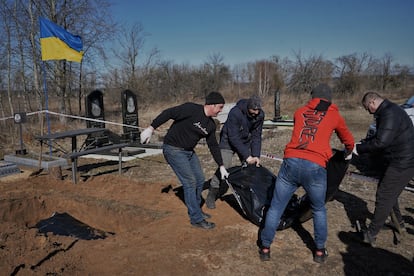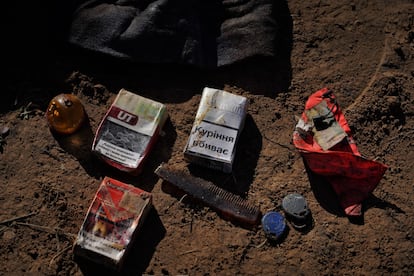A jacket, a shoe, a comb: Ukraine still exhuming victim remains in Kyiv region
The testimony of a neighbor led to the bodies and personal belongings of three men who died in Borodianka and that he himself buried before fleeing the war


The concentrated smell of rotten humidity spreads with the help of the light breeze as soon as the first black plastic bag is opened. Three bodies are being exhumed a year later. There are still graves to be dug, a year after Russian troops gained a stronghold in Kyiv’s metropolitan area amid heavy fighting at the end of February 2022. Up to 278 people are still officially missing in this region. Testimony by a local resident has led to the discovery of three bodies that he himself helped bury at the entrance to a cemetery in Borodianka, some 50 kilometers northwest of the Ukrainian capital. The man fled abroad and only now, after returning to Ukraine, has he reported it to the authorities.
There are also 197 bodies that remain to be identified, according to data provided at the burial site by the police chief of the Kyiv region, Andri Niebitov. The failed attempt by the Kremlin’s army to take Kyiv left 1,373 civilians dead. In this area around the capital, towns like Bucha and Irpin were the scene of some of the worst massacres committed by the Russian military in Ukraine.
Authorities are still looking for burials like this one at Borodianka. The police chief states that now, as the months go by, people feel safer to speak out and give details that may be useful to uncover possible abuses committed by Russian troops. For this reason, “unfortunately,” there will be more graves, he points out. His forecast is that as more people return to their homes after having fled the war, the more likely it is that new corpses will be found, helping get a sense of the true dimension of what happened here. Some missing persons might have died in the shelling that took place in late February and March. Those remains may never be recovered. Others, it is suspected, may lie buried in unidentified places.
Niebitov estimates that around 170 cases point to possible war crimes committed by Russian soldiers in the Kyiv region. Investigators continue to collect new evidence in videos, phone calls, neighbor testimonies and other sources. Niebitov said authorities have made mechanisms available to citizens who consider that they have information that may be valuable.

At noon last Thursday in Borodianka, several workers extracted three body bags from a hole in the reddish earth and lined them up. A police officer took notes while narrating everything that was happening for a colleague capturing the scene with a video camera. A golden tooth, a shoe, clothes, wounds... The process was repeated: first the black bag was unzipped and then the body’s clothes searched pocket by pocket to try to locate documentation or personal belongings that might help identify the victim.
At the foot of each body, a number from one to three. Officially, none have a name, but there are suspicions as to who number two is, police officials implied, while adding that it is necessary to wait for definitive forensic confirmation. This body was found on a street in Borodianka in the first week of March 2022, slumped over the steering wheel of a car that had been riddled with bullets and gone up in flames.
One of the cemetery workers helping with the grave opening rummaged with his rubber gloves inside the jacket that the victim was wearing at the time of death. After finding nothing on the left side, he started pulling belongings from the right. Several packets of tobacco, some money, a comb, a facemask… Also, oddly out of place, the shoe he was wearing on his left foot. The other two men unearthed this Thursday were shot dead in the same town.
In the Kyiv region alone, 1,373 civilians are known to have lost their lives during the roughly five-week period of Russian occupation last year, according to Niebitov. Some 700 died from gunshots, around 350 from shrapnel or bombardments, and the rest because they did not receive medical attention or ended up dying alone.
Sign up for our weekly newsletter to get more English-language news coverage from EL PAÍS USA Edition
Tu suscripción se está usando en otro dispositivo
¿Quieres añadir otro usuario a tu suscripción?
Si continúas leyendo en este dispositivo, no se podrá leer en el otro.
FlechaTu suscripción se está usando en otro dispositivo y solo puedes acceder a EL PAÍS desde un dispositivo a la vez.
Si quieres compartir tu cuenta, cambia tu suscripción a la modalidad Premium, así podrás añadir otro usuario. Cada uno accederá con su propia cuenta de email, lo que os permitirá personalizar vuestra experiencia en EL PAÍS.
¿Tienes una suscripción de empresa? Accede aquí para contratar más cuentas.
En el caso de no saber quién está usando tu cuenta, te recomendamos cambiar tu contraseña aquí.
Si decides continuar compartiendo tu cuenta, este mensaje se mostrará en tu dispositivo y en el de la otra persona que está usando tu cuenta de forma indefinida, afectando a tu experiencia de lectura. Puedes consultar aquí los términos y condiciones de la suscripción digital.








































